|
|
|
Sort Order |
|
|
|
Items / Page
|
|
|
|
|
|
|
| Srl | Item |
| 1 |
ID:
088474
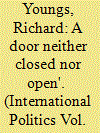

|
|
|
|
|
| Publication |
2009.
|
| Summary/Abstract |
Ukraine provides evidence of very different Common Foreign and Security Policy negotiating dynamics. In the run up to the country's Orange Revolution, significant differences persisted between member states over how the European Union (EU) should support Ukraine's democratic transition. A combination of normative entrapment and co-operative bargaining ensured that 'maximalist' and 'minimalist' member states united around a common position in support of the Orange Revolution. In subsequent debates over whether the EU should offer Ukraine a membership prospect, however, lowest common denominator dynamics prevailed. This case additionally demonstrates that both before and after Ukraine's democratic transition very specific external geostrategic factors played an important role in conditioning EU policy outcomes
|
|
|
|
|
|
|
|
|
|
|
|
|
|
|
|
| 2 |
ID:
171817


|
|
|
|
|
| Summary/Abstract |
In the aftermath of the EU’s diplomatic mission to resolve the Orange Revolution in 2004, several Russian policy makers perceived the EU as an aggressive actor which sought to undermine Russia’s influence in the post-Soviet space. About a decade later, Russian policy makers are mocking the EU’s limited abilities in the ongoing Ukraine crisis. The purpose of this article is to explain the reasons for this change of the EU’s abilities by focusing on its state-building in Ukraine. The article examines the EU’s state-building initiatives in Ukraine between November 2013 and July 2015. The article assesses the factors which shape the EU’s state-building in Ukraine. It argues that the EU’s state-building was hampered by two interrelated factors. First, the EU did not possess the policy tools to counter-balance Russia’s affirmative foreign policy towards Ukraine which was reflected in Crimea’s annexation to Russia. Second, as a consequence, this annexation turned Ukraine into a case of contested statehood.
|
|
|
|
|
|
|
|
|
|
|
|
|
|
|
|
| 3 |
ID:
146763
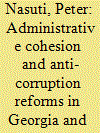

|
|
|
|
|
| Summary/Abstract |
Previous studies of former communist countries have linked decentralisation of power to a greater likelihood of reform. An analysis of the anti-corruption drives in Georgia and Ukraine after their respective ‘colour revolutions’, however, suggests that Georgia’s greater centralisation was integral to its success in enacting anti-corruption measures. In explaining why this contradictory result happened, this article argues that a centralised government can be more effective at implementing reforms than a decentralised one as long as the background and preferences of the ruling administration are conducive to change.
|
|
|
|
|
|
|
|
|
|
|
|
|
|
|
|
| 4 |
ID:
144614
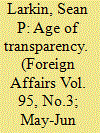

|
|
|
|
|
| Summary/Abstract |
Transparency has long been a rare commodity in international affairs. But today, the forces of technology are ushering in a new age of openness that would have been unthinkable just a few decades ago. Governments, journalists, and nongovernmental organ¬izations (NGOs) can now harness a flood of open-source information, drawn from commercial surveillance satellites, drones, smartphones, and computers, to reveal hidden activities in contested areas—from Ukraine to Syria to the South China Sea
|
|
|
|
|
|
|
|
|
|
|
|
|
|
|
|
| 5 |
ID:
134097
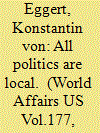

|
|
|
|
|
| Publication |
2014.
|
| Summary/Abstract |
Let us drink to Putin! He is doing so many good things for us." This toast from a friend's mother, at a recent friendly gathering of neighbors at my dacha near Moscow, made a few of us around the table feel a little uneasy. I think it was the first time that I'd heard someone proposing to drink the health of one of our heads of state when it wasn't required by protocol. However, this lady's emotions were sincere and, given the circumstances in Russia today, quite logical. Vladimir Putin's Crimean blitz was a very domestic Russian affair, designed to give the people a new sense of imperial pride and, by extension, provide the Kremlin with a badly needed popularity boost. In this regard, it succeeded beyond expectation. Even the tragedy of Malaysia Airlines Flight 17 did not shake the foundations of the conviction that most Russians hold: their country is a beacon of moral fortitude and spiritual greatness besieged by the Western forces of atheism, permissiveness, and greed.
|
|
|
|
|
|
|
|
|
|
|
|
|
|
|
|
| 6 |
ID:
138480
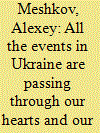

|
|
|
| 7 |
ID:
100706
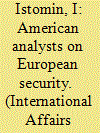

|
|
|
|
|
| Publication |
2010.
|
| Summary/Abstract |
THE PEACE AND SECURITY INSTITUTES of Europe have changed a lot during the two post-Cold War decades yet its image of the most peaceful continent with a stable security architecture is a gross overstatement. There is a mounting concern among some of the European countries with the NATO-centered system or, at least, with some of its aspects. NATO membership for Ukraine and Georgia was one of such debatable issues; the NATO members procrastinated far too long in ratifying the adjusted CFE Treaty until Russia suspended its implementation of the Treaty. The 2008 armed conflict around South Ossetia just added tension to the far from simple situation.
|
|
|
|
|
|
|
|
|
|
|
|
|
|
|
|
| 8 |
ID:
008590
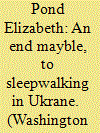

|
|
|
|
|
| Publication |
Winter 1995.
|
| Description |
73-81
|
|
|
|
|
|
|
|
|
|
|
|
|
|
|
|
| 9 |
ID:
193550
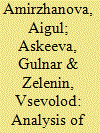

|
|
|
|
|
| Summary/Abstract |
This study conducts a comparative analysis of Ukraine and the Republic of Kazakhstan, two post-Soviet states facing ongoing contradictions and challenges in mutual understanding. Following the collapse of the Soviet Union, these states embarked on their own paths of national development, influenced by various political, economic, socio-cultural, and ethnic factors. This study examines the formation of political parties, the development of political and electoral culture, and the legal approaches to organizing the electoral process in Ukraine and Kazakhstan. Additionally, it explores the manipulation of electoral behavior through a specific case study. The study employs standard political research methods such as comparative analysis, anthropological and structural-functional approaches, content analysis, and a systematic approach. The findings of this study serve as valuable information for experts involved in organizing electoral processes, researchers in comparative political science, and readers interested in the subject matter.
|
|
|
|
|
|
|
|
|
|
|
|
|
|
|
|
| 10 |
ID:
130322
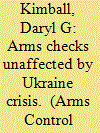

|
|
|
|
|
| Publication |
2014.
|
| Summary/Abstract |
Although the widening confrontation over the political future of the Crimean peninsula and other parts of the former Soviet Union has ruptured already-strained relations between Moscow and the West and put at risk the implementation of some nuclear risk-reduction initiatives and agreements, Russia is not planning to stop allowing the on-site inspections required under the 2010 New Strategic Arms Reduction Treaty (New START), Russian officials said last month. To protest Russia's actions to take control of Crimea, the seven non-Russian members of the Group of Eight (G-8) industrialized countries have suspended Russia's membership in the group. As part of that decision, the seven countries-Canada, Italy, France, Germany, Japan, the United Kingdom, and the United States-changed the location of their planned June summit from Sochi to Brussels. The Russian actions in Crimea have disrupted planning for the activities of the Global Partnership against the Spread of Weapons and Materials of Mass Destruction, which the G-8 launched in 2002.
|
|
|
|
|
|
|
|
|
|
|
|
|
|
|
|
| 11 |
ID:
130356
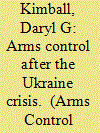

|
|
|
|
|
| Publication |
2014.
|
| Summary/Abstract |
The Global Nuclear Disarmament and risk reduction enterprise is at a crossroads as U.S.-Russian relations have reached perhaps their lowest point in more than a quarter century. Nevertheless, it remains in U.S. and Russian interests to implement existing nuclear risk reduction agreements and pursue practical, low-risk steps to lower tensions. Present circumstances demand new approaches to resolve stubborn challenges to deeper nuclear cuts and the establishment of a new framework to address Euro-Atlantic security issues.
Even before the recent political turmoil in Ukraine and Russian President Vladimir Putin's extralegal occupation and annexation of Crimea, relations between Moscow and Washington were chilly. Despite U.S. adjustments to its missile defense plans in Europe that eliminate any threat to Russian strategic missiles, Putin rebuffed U.S. President Barack Obama's proposal last June to reduce U.S. and Russian strategic stockpiles by one-third below the ceilings set by the New Strategic Arms Reduction Treaty (New START).
Moving forward will be difficult, but doing nothing is not an option. Through earlier crises during and after the Cold War, U.S. and Russian leaders pursued effective arms control and disarmament initiatives that increased mutual security and significantly reduced the nuclear danger. Much has been achieved, albeit too slowly, but there is far more to be done.
As the world's non-nuclear-weapon states persuasively argue, U.S. and Russian stockpiles still far exceed any plausible deterrence requirements, and the use of just a few nuclear weapons by any country would have catastrophic global consequences. As the 2015 Nuclear Nonproliferation Treaty (NPT) Review Conference approaches, pressure to accelerate action on disarmament will only grow.
For now, neither Russia nor the United States wants to scrap the existing arms control regime, including New START and the Intermediate-Range Nuclear Forces (INF) Treaty, which provide greater predictability and stability in an otherwise strained bilateral relationship. A return to a period of unconstrained strategic nuclear competition would not only deepen the distrust and increase dangers for both sides, but also would undermine the NPT. Scrapping the existing nuclear risk reduction measures would do nothing to protect Ukraine from further Russian aggression or reassure nervous NATO allies.
Unfortunately, the profound tensions over Ukraine delay the possibility of any formal, bilateral talks on nuclear arms reductions and missile defense. In light of these realities, Obama and other key leaders must explore alternative options to reduce global nuclear dangers and defuse U.S.-Russian strategic tensions.
|
|
|
|
|
|
|
|
|
|
|
|
|
|
|
|
| 12 |
ID:
192141
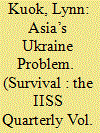

|
|
|
|
|
| Summary/Abstract |
Many Asian governments regard Russia’s war with Ukraine as a distant event with limited impact on the region, beyond rising food and energy prices and possibly increasing the risk of China attacking Taiwan. But the war has strained the rule of law and is entrenching ideological divisions, introducing unnecessary complexity into alliances and partnerships. Asian governments should be alert to the negative implications of these developments for regional peace and security. For them to condemn Russia’s invasion of Ukraine and defend the rule of law would not be to blindly support the West, and would be entirely consistent with their national interests. The West, for its part, should avoid worsening geopolitical fault lines. To this end, the United States might refrain from characterising great-power competition as a battle between autocracies and democracies, and from painting China and Russia with the same broad ideological brush.
|
|
|
|
|
|
|
|
|
|
|
|
|
|
|
|
| 13 |
ID:
189763
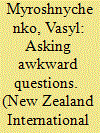

|
|
|
|
|
| Summary/Abstract |
Russia's blatant aggression against Ukraine, a founding member of the United Nations, has dramatically changed the world order. In responding to this crisis, Ukraine has demonstrated a resilience the world has not seen since the Second World War. The events of the last six months have raised awkward questions for countries all over the world, including New Zealand. Will they stand up to this outrageous breach of international law? What are the implications of the struggle in Ukraine for security in other parts of the world? It is very important to send the message that there is no tolerance of bullies.
|
|
|
|
|
|
|
|
|
|
|
|
|
|
|
|
| 14 |
ID:
065239
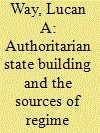

|
|
|
| 15 |
ID:
098021
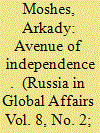

|
|
|
| 16 |
ID:
184590
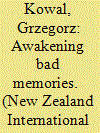

|
|
|
|
|
| Summary/Abstract |
Russia's aggression against Ukraine demonstrates that, for Moscow, the use of military power has always only been an extension of diplomacy and a tool for pursuing pure national interests. Diplomatic measures attempted by the whole world did not yield any results. It is now clear more than ever that President Vladimir Putin's Russia is ready to counteract imaginary threats even using such extreme measures as war. For Poles, the Russian government's rhetoric is gruesomely reminiscent of 1939 when the Soviet Union, together with Nazi Germany, invaded Poland. It also explains why Poland stands so firmly in solidarity with Ukraine today.
|
|
|
|
|
|
|
|
|
|
|
|
|
|
|
|
| 17 |
ID:
132081


|
|
|
|
|
| Publication |
2014.
|
| Summary/Abstract |
The NATO summit in Wales will be one of the most important since the Cold War ended - the first such summit after what is, undeniably, the end of the post-Cold War era. The goals of transitioning Afghanistan operations, preparing NATO for future challenges, and cementing the transatlantic bond have all been lent urgency by the crisis in Ukraine and the collapse of positive relations with Russia. James Bergeron explores where NATO has been on its twenty-five-year journey through the post-Cold War era and surveys the strategic challenges that the Alliance now confronts.
|
|
|
|
|
|
|
|
|
|
|
|
|
|
|
|
| 18 |
ID:
129515
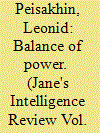

|
|
|
| 19 |
ID:
106282
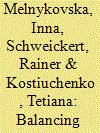

|
|
|
| 20 |
ID:
152676
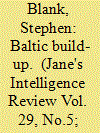

|
|
|
|
|
|
|
|